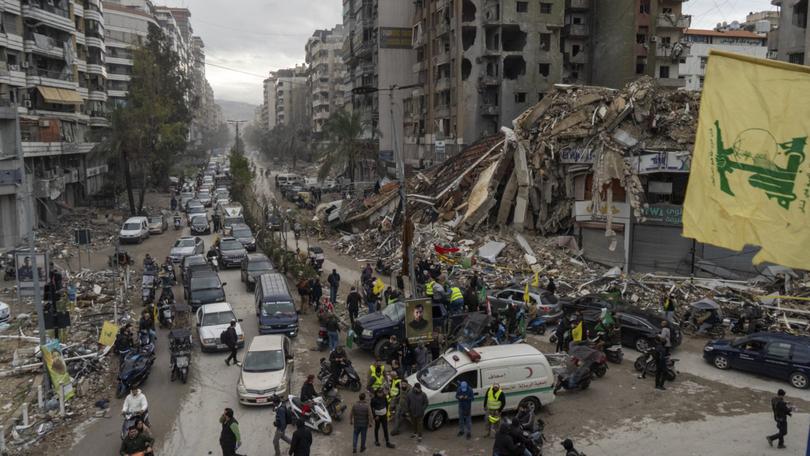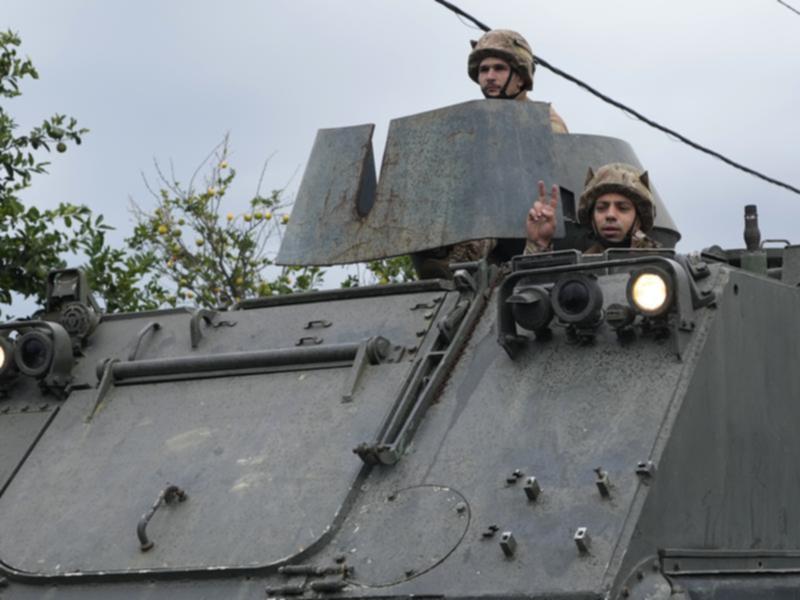Thousands of Lebanese return to rubble-strewn homes as Israel-Hezbollah truce holds
Displaced Lebanese people have been heading toward home, as an Israeli-Hezbollah truce is hailed as a 'first ray of hope' by the UN chief.

A ceasefire between Israel and Lebanese armed group Hezbollah is holding as tens of thousands of people in both countries began returning to homes in the border area shattered by 14 months of fighting.
UN Secretary-General Antonio Guterres said the ceasefire was “the first ray of hope” in months of Middle East conflict.
Iranian Foreign Minister Abbas Araqchi said Iran welcomed the truce and hoped it would be permanent.
Sign up to The Nightly's newsletters.
Get the first look at the digital newspaper, curated daily stories and breaking headlines delivered to your inbox.
By continuing you agree to our Terms and Privacy Policy.The agreement, a rare diplomatic feat in a region racked by conflict, ended the deadliest confrontation between Israel and the Iran-backed militant group in years.
Cars and vans piled high with mattresses, suitcases and even furniture streamed through the heavily bombed Lebanese port city of Tyre heading south, carrying some of the roughly 1.4 million people believed to have been uprooted by the conflict. The road from the Lebanese capital to the south was jammed from before dawn with thousands of people heading home.
“What we feel is indescribable,” said one Lebanese driver on the road to the south. “The people have won!”
In the southern Lebanese village of Zibqin, Asya Atwi returned to her ruined home with her husband and daughter.
“The important thing is that we’re back, against Israel’s will and against the will of all the enemies,” she said. “We came back to our hometown, and we will sleep on the rubble.”
Zahi Hijazi, 67, took advantage of the truce to visit his damaged apartment in Beirut’s southern suburbs, a Hezbollah stronghold that Israel bombed heavily.
“Our lifetime’s savings ... All this destruction,” he said.
But that did not stop Hezbollah from proclaiming “victory” over Israel in a statement released Wednesday.
“Victory from God almighty was the ally of the righteous cause,” the statement said.
Hezbollah said its fighters “remain fully equipped to deal with the aspirations and assaults of the Israeli enemy.” Its forces will monitor Israel’s withdrawal from Lebanon “with their hands on the trigger”.
Lebanese parliament speaker Nabih Berri called on the displaced to go back to their homes despite the devastation.
“I invite you to return to your homes... return to your land,” said Berri, who led negotiations on behalf of his ally Hezbollah.
In Israel there was no indication of a return en masse of the 60,000 people driven from their homes by Hezbollah fire.
“On one hand, we are happy about the ceasefire because it feels safer, our children can go back to school,” said 43-year-old Yuri, a resident of Kibbutz Yiron near the Lebanese border, who fled to the northern city of Haifa.
“On the other hand... Hezbollah still has forces, and we don’t see when this will truly come to an end.”
The ceasefire promises to end a conflict across the Israeli-Lebanese border that has killed thousands of people since it was ignited by the Gaza war last year.
Israel has said its military aim in Lebanon was to ensure the safe return of about 60,000 Israelis who fled communities along the northern border when Hezbollah started firing rockets at them in support of Hamas in Gaza in October 2023.
Under the ceasefire terms, Israeli forces can remain in Lebanon for 60 days.

Israeli Prime Minister Benjamin Netanyahu said he had told the military not to allow residents back to villages near the border, after four Hezbollah operatives were detained in the area.
Lebanon’s army, entrusted with ensuring the ceasefire lasts, said it had begun deploying additional troops south of the Litani, into a region heavily bombarded by Israel in its battle against Hezbollah.
The Lebanese army urged returning residents not to approach areas where Israeli forces were present for their own safety.
Israeli chief of the general staff Herzi Halevi said Israel’s enforcement of the ceasefire would be very determined.
“Hezbollah operatives who approach our troops, the border area and the villages within the area we have marked will be struck ... we are preparing, getting ready for the possibility that this (ceasefire) approach won’t succeed,” he said.
Israel’s attacks have also struck eastern cities and towns and Hezbollah’s stronghold in the southern suburbs of Beirut, and Israeli troops have pushed about 6km into Lebanon in a series of ground incursions launched in September.
But Israel is still fighting its other arch foe, the Palestinian militant group Hamas, in the Gaza Strip.
Diplomatic efforts will now turn to the Gaza Strip, where Israel has vowed to destroy Hamas, which led the October 7, 2023 attacks on Israeli communities.
Hamas official Sami Abu Zuhri told Reuters that the group “appreciates” Lebanon’s right to reach an agreement which protects its people, and hopes for a deal to end the Gaza war.
But many Gaza residents said they felt abandoned.
“We hope that all Arab and Western countries, and all people with merciful hearts and consciences ... implement a truce here because we are tired,” said displaced Gazan Malak Abu Laila.
